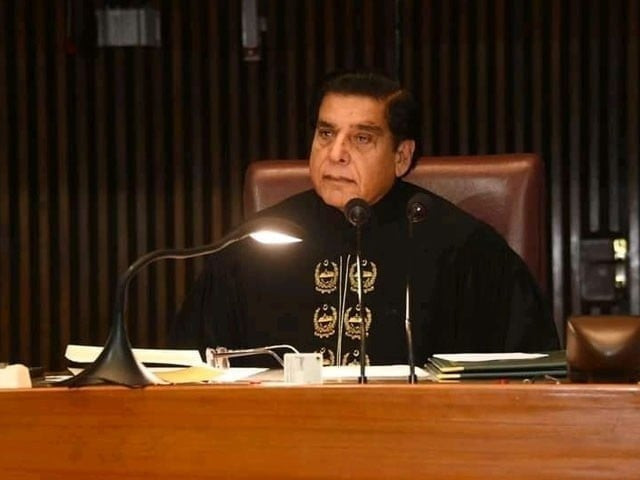Speaker insists on hand-written PTI resignations
Party delegation to meet NA speaker today to take up matter

National Assembly Speaker Raja Pervaiz Ashraf on Wednesday asked PTI MNAs to tender hand-written resignations to him, saying that the purpose of calling these lawmakers in person was to ensure that they were “willingly” leaving their seats in the House.
A meeting is scheduled to be held between the PTI MNAs and the NA speaker on Thursday (today) at 11:30am.
A total of 123 PTI MNAs had resigned en masse on April 11 -- two days after their party chairman Imran Khan was ousted from the post of the premier through a no-confidence motion.
Former NA deputy speaker Qasim Suri had accepted their resignations.
However, on April 17, the newly elected NA speaker directed the assembly secretariat to deal with the resignations of the PTI lawmakers afresh and present them before him so that they could be treated as per law.
The ruling of the 22nd speaker of the assembly had come amid claims and speculations that some of the PTI lawmakers had been willing to retract their resignations and had been conveying messages that they should not be accepted.
Later in June, the ruling coalition had formulated a strategy on the matter of en masse resignations of the PTI lawmakers and agreed to proceed with phase-wise acceptance.
After that, the NA speaker accepted only 11 of the 123 resignations.
Parliamentary sources disclosed that about 30 members of the former ruling party did not want to leave the legislature, adding that these lawmakers could directly reach out to the NA speaker to stop the acceptance of their resignations.
Later, the Islamabad High Court (IHC) had termed the resignations of 123 PTI MNAs “suspicious” after it was informed that the parliamentarians were not called in a personal capacity before the NA speaker and it also suspended the resignation of one of the 11 accepted resignations.
In the meeting with the NA speaker on Thursday, the PTI delegation, led by party’s Senior Vice President Shah Mahmood Qureshi, would devise a strategy on the issue of the verification of resignations.
Other members of the PTI delegation include party leaders Aamir Dogar, Asad Umar, Fawad Chaudhry, Pervez Khattak and Asad Qaiser.
The NA speaker, while talking to the media in Islamabad, said PTI’s Dogar had contacted him to discuss the issue of resignations.
The speaker added that he had informed the PTI lawmakers that he had reached the federal capital.
Ashraf further said he had told Dogar that the policy on the issue of resignations was “very clear”, adding that the basic constitutional procedure was that every member should submit a hand-written resignation.
He pointed out that the resignations of the PTI lawmakers were not hand-written and recalled that the MNAs did not appear before him when they were summoned earlier.
Ashraf said the purpose of calling every PTI member was to ensure that they were tendering their resignations willingly.
“I suspected that they were not willing to tender their resignations when they did not appear before me the last time,” he added.
The NA speaker maintained that a few PTI MNAs had requested him not to accept their resignations, saying he could not disclose their names.
Ashraf urged the former ruling party lawmakers to come individually and not in the form of a group to submit their resignations to him.
Later, in a discourse with the journalists, Ashraf urged all the political parties to work for the betterment of the country.
The NA speaker said that he would not accept the resignations in haste but would follow rules and regulations for this purpose.
Separately, at a news conference in Islamabad, PTI leader Fawad Chaudhry reminded that the PTI members “stood up in the House and resigned”.
He complained that his party MNAs had not received salaries since April. He added that elections had not been held for the seats on which resignations were tendered.
Fawad said that now the NA speaker was calling the PTI lawmakers to submit their resignations, but claimed that “Ashraf and cabinet members remained on foreign tours”.



















COMMENTS
Comments are moderated and generally will be posted if they are on-topic and not abusive.
For more information, please see our Comments FAQ